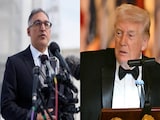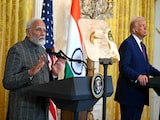Harish Salve, the former Solicitor General of India, weighed in on the issue of judicial appointments issue today, saying judges appointing judges is a "deeply flawed system" that doesn't exist anywhere else in the world. In an exclusive interview with NDTV, he also sounded a note of caution, saying courts should not be the first stop for resolution of any issue, and must intervene "only when there is a genuine constitutional issue". But even there, the interpretation of the constitution is "dynamic" and changes with the "mindset" of the court, he said.
There was also a note of criticism towards the earlier governments, which "left important decisions to courts". "The government of the day maintains a line of distinction between courts, and government... and is making policies proactively," Harish Salve said in a conversation with NDTV's Editor-in-Chief Sanjay Pugalia as part of a special series to mark the 76th Independence Day.
As an example, he cited the situation when kar sevaks were in Ayodhya in 1992. Whether the army should take action on not was not a decision the government was willing to take, and they had left it to courts. There on, every decision of import was left to courts, he said.
The downside of it became clear in the coal scam case, when the Supreme Court cancelled mining licenses. "India lost face globally," he added.
There was also a word of warning -- "A court must reconsider its position as governments are now experimenting," he said.
Mr Salve -- one of the most sought-after veteran lawyers in India --- also enumerated the changes in the legal system, remarking that the courts have gone from being "leftist to centrist" and the Supreme Court has "expanded its jurisdiction to social issues".
But this also is a fallout of the people's approach. "Courts must not be first-stop shop for every issue," he said. The courts also "must intervene only when there is a genuine constitutional issue," he added.
There is a "lack of trust" in India's litigation processes globally, said Mr Salve, who has represented the country in crucial cases in the international court.
"India can become arbitration centre only when we develop confidence in Indian courts… India must evolve better litigation, dispute resolution, arbitration processes". India, he added, can only become an arbitration centre if "regressive mindsets" can be changed.
In a wide-ranging interview, Mr Salve said the perception about India has changed abroad, bringing about a "180-degree turn". "The world is turning to India for business, investment prospects and India is being looked at as economic powerhouse," Mr Salve said, calling it a "quantum change".
Asked about the key forward-looking steps the country should take, Mr Salve said Prime Minister Narendra Modi's vision is to transform India into a "global political powerhouse". "PM Modi's grand reception in foreign countries is a first for any Prime Minister… The role India playing in global disputes like the Ukraine war is remarkable," he said.
But the government's global mindset is missing in other institutions and services and the Prime Minister's focus on ease of doing business is getting "bogged down" by states. "Indians should trust their economy… Indians must become aspirational as our economy progresses," he added.















